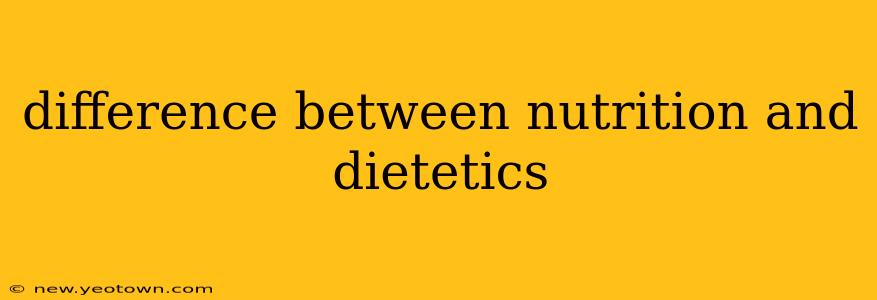Unveiling the Difference: Nutrition vs. Dietetics – A Tale of Two Disciplines
The terms "nutrition" and "dietetics" are often used interchangeably, leading to confusion. However, while closely related, they represent distinct yet complementary fields. Imagine them as two sides of the same coin – both crucial for understanding and applying the science of food and its impact on health. This exploration will delve into their differences, offering a clear understanding of each discipline.
What is Nutrition?
Nutrition is the broader field, encompassing the study of how nutrients and food affect the body. It's the foundational science, exploring the roles of carbohydrates, proteins, fats, vitamins, minerals, and water in maintaining health, growth, and disease prevention. Think of it as the overarching theory – the "why" behind food and health. Nutrition scientists conduct research, analyze data, and develop guidelines on dietary intake. Their work forms the basis for recommendations on healthy eating patterns and the prevention of diet-related diseases.
This field involves studying:
- Nutrient metabolism: How the body processes and uses nutrients.
- Nutrient requirements: Determining the amount of each nutrient needed for optimal health.
- The impact of nutrients on health: Investigating the links between diet and various health outcomes.
- Dietary guidelines and recommendations: Developing and disseminating guidelines for healthy eating.
What is Dietetics?
Dietetics, on the other hand, is the applied science of nutrition. It bridges the gap between nutritional theory and practical application. Registered Dietitians (RDs) or Registered Dietitian Nutritionists (RDNs) are the professionals who apply the principles of nutrition to improve people's health. They're the ones who take the scientific findings and translate them into personalized dietary plans and interventions. Think of it as the practical implementation – the "how" of healthy eating.
Dietetics involves:
- Individualized meal planning: Creating tailored dietary plans based on individual needs, health conditions, and preferences.
- Medical nutrition therapy: Providing nutritional care for individuals with chronic diseases like diabetes, heart disease, or kidney disease.
- Community nutrition: Working in public health settings to improve the dietary habits of populations.
- Food service management: Overseeing the nutritional quality of food in institutions like hospitals, schools, and restaurants.
What's the difference in a nutshell?
The key distinction lies in their focus:
- Nutrition focuses on the scientific understanding of nutrients and their effects.
- Dietetics focuses on applying nutritional knowledge to improve individual and community health.
One might study the intricacies of carbohydrate metabolism in a nutrition research lab, while another might be counseling a patient on managing their diabetes through dietary changes in a clinical setting. Both roles are essential, and a strong understanding of nutrition is fundamental to practicing dietetics.
What are the educational requirements for each field?
The educational pathways for nutrition and dietetics differ:
-
Nutrition: Typically requires a bachelor's degree in nutrition science or a related field, often leading to research-based careers. Advanced degrees (master's or doctorate) are often pursued for specialized roles.
-
Dietetics: Requires a bachelor's degree in dietetics or a related field, followed by a supervised practice program (internship) and passing a national registration exam to become a Registered Dietitian Nutritionist (RDN). Further specialization may be pursued through additional certifications or advanced degrees.
How do Nutrition and Dietetics Intersect?
They are intrinsically linked; dietetics relies heavily on nutritional science for its foundations. Advances in nutrition research directly impact the practice of dietetics, leading to updated dietary guidelines and more effective interventions. A strong foundation in nutrition is crucial for any aspiring dietitian.
What are some common career paths in each field?
Nutrition: Research scientist, nutrition educator, public health nutritionist, food industry professional, regulatory affairs specialist.
Dietetics: Registered Dietitian Nutritionist (RDN), Clinical Dietitian, Community Nutritionist, Food Service Director, Pediatric Dietitian, Sports Dietitian.
In essence, nutrition provides the knowledge base, and dietetics provides the practical application. Both fields are critical for improving health and well-being through food and nutrition.

